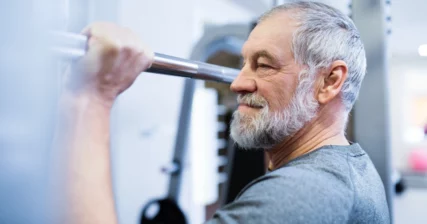Listen on: Apple Podcasts | Spotify
Though this isn’t a long post, it’s 20 years in the making, as tomorrow marks my 20th year as a fitness professional.
As I look back on the 20 years, I realize how much my eyes have opened to the myths and misinformation (or is it disinformation) surrounding health and fitness.
Sadly, much of the pseudoscience and ridiculous public health recommendations persist today, passed along by some well-meaning personal trainers and dietitians, and many charlatans hoping to make a bunch of money from people looking for quick fixes and “cutting-edge” gimmicks.
I don’t know that there’s been a week that’s gone by where I haven’t read health-related research papers and books over those two decades. I’ve never stopped learning because, in my opinion, doing so wouldn’t just hurt me. It would hurt anyone I had a chance to train or educate.
Through it all, I’ve tried to simplify what it takes to get and stay fit and healthy. I’ve also tried to help people think differently about the choices they make each day, which lead them closer to health, or closer to disease.
When I first considered writing this “20-Year Anniversary” blog post, I thought about listing out all of the myths and misguided recommendations health and fitness professionals pass along to patients and clients.
Instead, I decided to outline the three overarching factors that affect whether you get fit, or whether you get fat; whether you get healthy or succumb to disease, and whether you live many years with great quality-of-life or wither away in the comfort of a recliner.
When I make nutrition, exercise, and lifestyle recommendations, I do so with the goal of improving one or each of these three factors, and never negatively impacting any of them.
Of course, the following are the three overarching aims of VIGOR Training, my online fitness membership.
Hormone balance
You tell your body to burn or store fat, build or breakdown muscle, feel hungry or satisfied or frisky or flat, fall asleep or lie in bed wide awake, and so much more, with the hormones you secrete.
You affect a myriad of hormones by:
- The types, not quantity of foods you eat
- Your choice of exercise (cardio, high-intensity training, or resistance training)
- When you go to sleep
- How late you expose yourself to blue light from the TV and mobile devices
- Medications and supplements you take
- Your reaction to your family, friends, and what’s going on in the world
- The number of meals you eat each day
I could go on and on. The point is, if you live like much of the world, you’ll:
- Produce excess insulin, making you fatter and more fatigued, eventually leading to Type II diabetes
- Suppress leptin and increase ghrelin, making you chronically hungry
- Suppress thyroid and testosterone, making you feel depressed and fatigued, causing muscle loss and making it difficult to think clearly
- Suppress growth hormone and melatonin, making it difficult to sleep well and repair damaged tissues
- Raise cortisol, leading to muscle loss, a shrinking brain, and suppressed immune system
None of what I’ve stated is new information. It’s been documented for decades. And yet, if you talk with a typical doctor, he or she rarely discusses your hormones.
Instead, they’ll recommend reducing calories, which suppresses thyroid, increases hunger, and does nothing to impact your health or fitness long-term. Maybe they’ll prescribe a medication, which can further disrupt the hormonal imbalance you’re already experiencing.
They don’t measure your hormones, and they certainly don’t give you advice that helps you optimize them. At least most doctors don’t.
Do you know the three most important choices you can make in optimizing your balance of hormones?
- Sleep at least seven hours each night
- Eat a high-protein diet
- Strength train at least four days per week
Are there other factors that improve your balance of hormones? Absolutely. But no nutrition or lifestyle choice will impact them as much as the three above.
If you don’t choose lifestyle and nutrition choices that optimize your hormones, you’ll cause massive muscle loss and reduce your ability to handle stress as well.
Muscle Mass
Twenty years ago, talking about muscle mass often conjured up images of Arnold Schwarzzenger busting out of a sleeveless shirt. Times have changed. Arnold has aged and become an advocate for the far left, and building muscle has become more accepted among average men and women.
However, a still small percentage of people actually focus on building muscle. As I always say,
Muscle mass is your quality-of-life investment account. The more you have when you reach old age, the longer you can live with the same quality-of-life.
Muscle is a significant factor in longevity. More so than the amount of fat you carry.
Muscle increases your capacity for storing carbohydrates, so your carbs don’t increase body fat or raise triglycerides.
Building muscle usually builds bone density too, reducing the risk of osteoporosis.
Muscle raises metabolic rate, gives strength to your joints, improves your agility and ability to react to missteps, and strengthens your immune system.
Skeletal muscle regulates immune system functions via myokine signaling and the expression of immune modulatory surface molecules. Immune cells in turn critically influence muscle mass and function. Therefore, skeletal muscle may act as a central integrator between sarcopenia and immune senescence (age-related loss of immune function).
Nelke C, et al.
In light of the circumstances from the past couple of years, consider just that one benefit of muscle. More muscle mass means a greater ability to fight off infection!
I understand why people often associate building muscle as an aesthetic thing. It’s how many fitness professionals and supplement companies market muscle building. They post take half-naked selfies or use photos from fitness models to sell their products and services.
Yet, the main benefits of muscle building have nothing to do with how you look without a shirt on. If anything, I tend to dismiss the nutritionists and personal trainers who use sex to sell, and trust those who choose to keep their shirts on.
The more muscle you build (naturally), the more likely it is you’ll maintain health and function at your best. The longer you maintain it, the longer you’ll continue experiencing health and great physical function.
Do you know the three most important choices you can make in building or maintaining muscle?
- Sleep at least seven hours each night
- Eat a high-protein diet
- Strength train at least four days per week
Are there other factors that improve your muscle mass? Absolutely. But no nutrition or lifestyle choice will impact them as much as the three above.
If you don’t make a concerted effort to build or maintain muscle mass, you’ll compromise your balance of hormones and reduce your ability to handle stress as well.
Read also: Bigger is Better: The Case for Building Muscle at Every Age.
Stress Resilience
“Experts” continue to vilify stress, as though it’s some kind of toxin that causes all sorts of health problems. Nothing could be further from the truth.
Stress is what makes us strong in every aspect of life…physically, mentally, emotionally, relationally, and professionally.
Our problem is not stress. It’s our inability to handle stress. To recover from stressful events.
Your body is designed to face a homeostatic stress, react to it, and then recover from it.
For example, if you’ve never taken a real sauna, and walk into one set at 205°F, you might last a couple of minutes before needing to get out. It’ll be even worse if you toss water on the hot rocks.
But if you try to stay in for three minutes, a few times per week, your body starts to react appropriately to the extreme heat, which makes the heat more tolerable.
With consistency, you’ll be able to stay in the sauna longer, meaning you adapt to handle a greater amount of heat stress. Once you work up to a couple of 15-minute sessions with a brief cooling off period in between, you start to gain the remarkable health benefits of the sauna.
Over time, you become more resilient to the sauna stress. On the other hand, if you have a health issue where you cannot sweat or regulate your core temperature, you won’t be able to handle the stress from the sauna.
We’ve progressively sabotaged our bodies’ abilities to handle physical, mental, and emotional stress.
Without a healthy response to stress, stress causes mental and physical dysfunction and disease.
Do you know the three most important choices you can make to enhance your stress resilience?
- Sleep at least seven hours each night
- Eat a high-protein diet
- Strength train at least four days per week
Are there other factors that improve your stress resilience? Absolutely. But no nutrition or lifestyle choice will impact them as much as the three above.
If you don’t make a concerted effort to build up your resilience to stress, you’ll cause massive muscle loss and compromise your balance of hormones as well.
Three Factors that Determine Your Health and Fitness
Perhaps, the way people are misled down futile paths towards fitness is by design. Food and pharmaceutical companies, media corporations, and the health(sick)care system make billions from people who eat diets that closely resemble The Dietary Guidelines for Americans, and who get caught up in exercise routines that do little more than entertain.
You can’t deny that our society, from Washington DC on down, is set up to make us sick and dependent on government.
More than ever, each of us needs to take 100% responsibility for our health and fitness, and understand that the talking heads aren’t talking about what actually makes us healthy and fit.
The process is actually simple, but runs counter to our culture’s agendas.
After pouring so much time into seeing the deceit and dysfunction first-hand, it’s easy for me to dismiss our government’s “scientists” who tell us they want to keep us safe.
But with a little learning (maybe through this blog or my online training program) and some discipline, you can easily gain control of your health and long-term wellbeing. It’s much more simple than you might think.
After 20 years of education, experience, and experimentation, everything I teach and recommend serves to support at least one, if not each of the three factors above. It’s become the core of VIGOR Training.
I can’t go back in time and erase some of the conventional and stupid advice I gave clients in my early years. But, I can do my best to break through the noise and confusion that still exists today, and show others there’s a more simple approach to becoming stronger and more resilient, physically, mentally, and emotionally.
It starts by consistently making choices that
- Optimize your balance of hormones
- Build or maintain muscle mass
- Strengthen your resilience to stress

Feel Better Fast. Guaranteed.
Energy+, EDGE, and MentaBiotics make up the Happy Juice supplement stack, with ingredients clinically proven to:
- decrease anxiousness scores by 55%
- decrease irritability scores by 60%
- decrease fatigue by 64%
- decrease anger 54%
- decrease tension by 45%
- decrease confusion by 43%
- decrease overall distress by 49%
- increase good bacteria by 70%
- decrease negative mood by 105%
- increase positive mood by 211%



